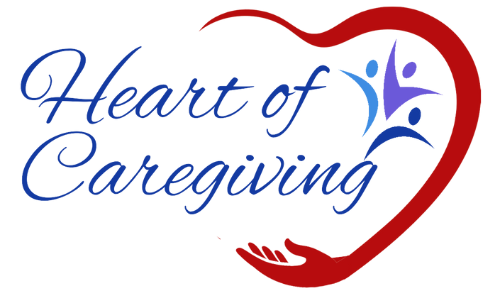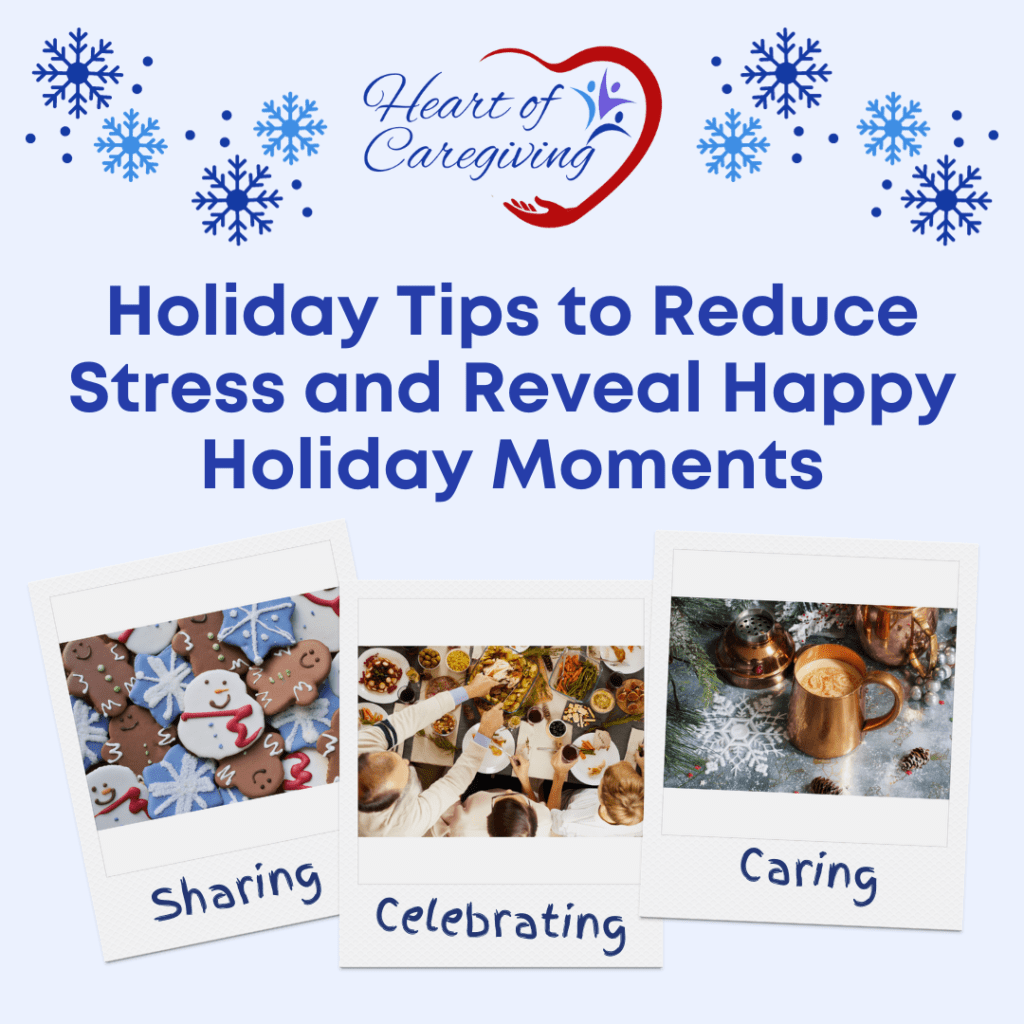If your holiday strategy is simply to survive, you are not alone. The holidays are challenging for many, and layers of caregiver stress add to the overwhelm. Here are three Heart of Caregiving holiday tips to help reduce stress and reveal happy holiday moments.
1. Prioritize relationships over traditions
While traditions hold significance, they might not always accommodate an aging family member’s changing circumstances or needs. Prioritizing relationships encourages flexibility, allowing you to adapt your approach to care according to the current situation, your needs, and your family member’s preferences. Balancing traditions with your family member’s evolving needs, capabilities, and desires will help the holidays feel meaningful and allow you to focus on relationships. While traditions hold significance, adapting to changing circumstances and prioritizing relationships can significantly enhance your shared experience and the well-being of you, the caregiver, and the person receiving care.
A personalized approach
Every person ages differently, and their needs evolve. Rather than adhering to fixed traditions, prioritizing relationships allows for a more personalized approach to enjoying the holidays. Being open to modifying or discarding traditions enables you to understand the evolving needs, preferences, and desires of your loved one, ensuring their care aligns with celebrations. It is normal for older adults to face various emotional challenges, including loneliness, anxiety, or feelings of being a burden. Prioritizing relationships helps create a supportive environment that can positively impact mental and emotional health and foster emotional connections. Making these decisions with your family member is a way of cultivating your relationship in its new form and shows respect for the autonomy and dignity of your family member. It allows them to express their preferences, choices, and values, fostering a sense of control over their own life.
A few examples
Here is one example of how to prioritize relationships over traditions. Instead of strictly adhering to long-standing family traditions for holidays or celebrations, prioritize the individual’s comfort and preferences. For instance, if your family traditionally hosts a large gathering for Thanksgiving, but your family member prefers a quieter environment, consider adapting the celebration to a smaller, more intimate gathering that aligns with their preferences. This shift allows for a more meaningful and enjoyable experience for your family member, emphasizing connection over rigid tradition.
Another example is that rather than sticking solely to traditional foods, prioritize your loved one’s preferences and needs regarding meals and food choices. Embracing these preferences can strengthen the bond between you and your loved one and keep the quality of care at the forefront.
2. Let grief lead you to gratitude
As caregivers, we experience grief over the loss of the relationship we once enjoyed with our family member. Grief is a complex and deeply personal experience that can evoke a range of emotions, including sadness, anger, and confusion. The holidays can be a particularly difficult time as memories of celebrations inspire feelings of loss and sadness. Surprisingly, within the realm of grief, gratitude can gradually emerge.
Grieving our past relationship often involves reflecting on memories shared with our aging family member. While initially painful, this reflection can lead to a sense of gratitude for having had those experiences, memories, and moments with the person. It shifts the focus from the loss to the richness of what was shared and the opportunity to continue to have shared experiences. Grief can bring about a heightened appreciation for life itself. Reflecting on our losses can serve as a stark reminder of the impermanence of life, prompting us to appreciate and be grateful for the moments we still have.
Shared experience of pain
Other family members, such as siblings, are also likely experiencing grief, and they may not understand the complexity of what they are feeling. Sharing your feelings with them can deepen connections as you both struggle to navigate the complexity of this new relationship with your parent. This shared experience of pain and support can lead to gratitude for each other, which provides comfort, understanding, and companionship during difficult times. Grief can inspire significant personal growth. We often develop a newfound resilience, empathy, or a deeper understanding of ourselves and others. Through this growth, we can uncover a sense of gratitude for the lessons learned and the strength gained from the experience.
Grief shifts our perspective
Grief can shift our perspective on life, values, and priorities. It can lead us to reevaluate what truly matters, prompting a sense of gratitude for the things that hold more profound significance in our lives. While grief is a painful and challenging experience, it can also open doors to moments of gratitude. It’s not about replacing the sorrow with gratitude but rather allowing both emotions to coexist, creating a space for healing and acknowledging the value of what has been lost and what remains.
3. Celebrate the love that inspired you to care
Caregiving is messy. It is complicated and all-consuming. When the struggles surpass the happy moments, we can forget what initially inspired us to care for our family member. Staying connected to the love that sparked your caregiving journey is essential amidst the challenges.
Each day, find a reason to celebrate
Take moments each day to reflect on what initially inspired you to become a caregiver. Recall your love, respect, and care for your family member. Write down or revisit moments that remind you of their significance in your life. This reflection can reignite the emotional core that motivated you to start this journey. If you still struggle to connect the dots to happier times, locate the photo albums that will bring back the memories. Flip through the family vacations, the celebrations, and previous holidays when the atmosphere wasn’t heavy with worry. Connect with the meaningful memories of love, the proud moments, and the milestones.
Find an opportunity each day to create new memories. Take photos and share stories about the events and moments that made your family bonds. Express your gratitude for the time you share together and with family and friends. Establish rituals or activities that honor your loved one’s life. It could be as simple as sharing stories about them, creating memory books or scrapbooks, or dedicating a specific day to activities they enjoyed. These rituals serve as opportunities to celebrate their life and their impact on yours.
Shared moments of joy
You can focus on creating and cherishing moments of joy with your loved one by engaging in activities they enjoy, whether listening to their favorite music, watching movies together, or going for walks. These shared experiences bring happiness and strengthen the bond between you both. Acknowledge that caregiving can be emotionally taxing. Practice self-compassion and seek support when needed. Engage with support groups, counseling, or close friends and family who understand your journey. Taking care of yourself allows you to continue providing the best care for your loved one.
By incorporating these practices into your caregiving routine, you can stay connected to the love that initiated this journey and create meaningful opportunities to celebrate and honor your loved one’s life. You can create new memories and new traditions that will become a cherished part of your experience.
For more on how to celebrate caregiving, get the Celebrate Caregiving Action Plan at HeartofCaregiving.com.
For more solutions to the common mistakes caregivers make, check out 21 Mistakes Caregivers Make & How to Avoid Them: Solutions and Strategies to Reduce Stress and Increase Happiness, available on Amazon!


